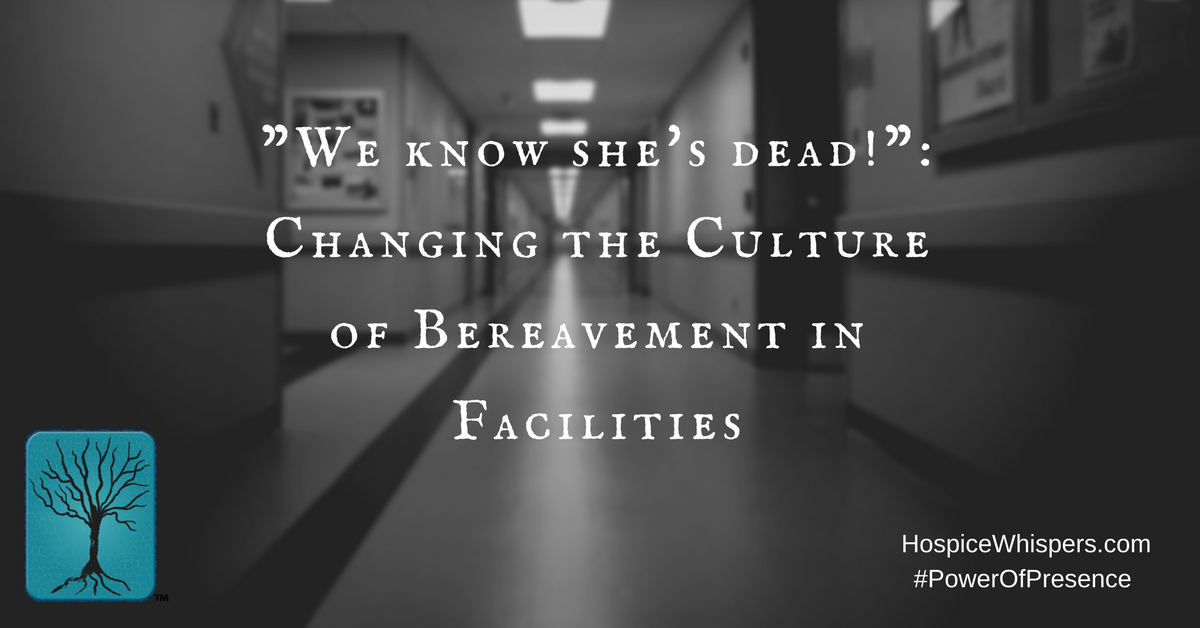As a hospice chaplain, I worked at numerous care facilities over the years and presided over dozens of memorials inside them, with the family’s permission and/or input and participation.
The staff who truly get it know how to mark these special occasions, for everyone’s sake.
They arrange flowers and photos and music.
They help all residents who wish to attend do so, even those with cognitive impairment or physical disability.
They share stories and laughter and tears, then host a lovely reception with snacks afterward.
I lead the service in the faith tradition of the one who has died, but stress that he/she would want everyone to feel welcome. My goal is to ensure everyone feels safe and comfortable, whatever their beliefs.
If it is a service for multiple residents of differing faiths, I lead it in an inter-faith manner to be respectful of all.
This approach is appreciated by all, since this is not the time to be opportunistic and promote my own faith just because I have a captive audience and a microphone.
That would be religiously abusive and has sullied many bereaved’s experience, which does not speak to me of the compassion that is my highest calling as a chaplain and minister.
Such services become part of the culture of these living communities and skilled nursing facilities who do it consistently and well. It creates a greater sense of connection, community, and dignity for all involved.
Patients sit up taller. Veterans offer a salute, even if they can no longer form speech.
Even those experiencing advanced dementia appear to recognize the ritual. Words to old sacred songs can still sometimes be sung, word for word, even when speech is long gone.
As many residents have said to me, “In our generation, this is just what you DO! You show up and pay your respects. It’s our way of still being of value, to come comfort the family and remember together the one who’s died.”
When we don’t address death directly and openly in facilities, it increases residents’ fears and sadness and frustration.
One spunky resident at a skilled nursing facility said to me after the death of one of her facility neighbors,
“What, do they think we don’t notice Sally’s no longer at breakfast or Bridge? We’re old. We’re not stupid. We know she’s dead. We deserve more than being snuck out of here like dirty garbage with no one saying a word. So does she!”
She’s right.
At these services, family members hear stories they never knew about before from residents and staff, and vice versa.
Families get the chance to say goodbye to the facility family of residents and staff who have often become a significant part of their lives as they have been with their loved one who lives there.
Staff get the chance to connect with their compassion satisfaction that combats compassion fatigue, by recounting what the person meant to them and being able to share tears at a service, where it is ethically appropriate to let down their guard and do so. They need to say goodbye, too!
For staff and residents who ordinarily wouldn’t be able to attend a service out in the community, memorials at the facility are such a gift for everyone, and it is humbling for me to be a part of such reverential beauty and sense of connection.
The New York Times posted an excellent article a couple of years ago about this very issue. My only critique is the title–they’re dead, not “lost”. Euphemisms around death may feel easier to us, but truly help no one and unintentionally dishonor reality.
I hope you’ll take a moment to read the article and consider ways to incorporate a better culture into your workplace. We can do better with handling death in such communities and, when we do, everyone experiences the benefits
Peace,
Carla



What considerations for privacy (HIPAA) should we be concerned with, if at all, in these memorials?
Great question, Dean! We always must consider what we are revealing by the way we engage with patients and their circle of care, especially during these times. For instance, I only announce myself at a memorial as having cared for a person being honored if I have the family’s consent.
If we, as a hospice, are going to engage in any public event, we need to make sure what our admissions paperwork includes with regards to release of information. An ethical argument arises when hospices lead a community memorial service and staff want to read the names of those who’ve died or list them in a program. Do we have permission to do this? If not, or if we are not certain, we need to do some due dilligence around the matter.
Again, great question we must consider!